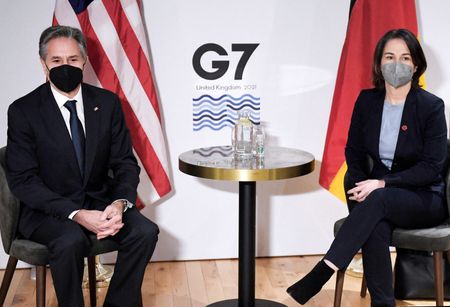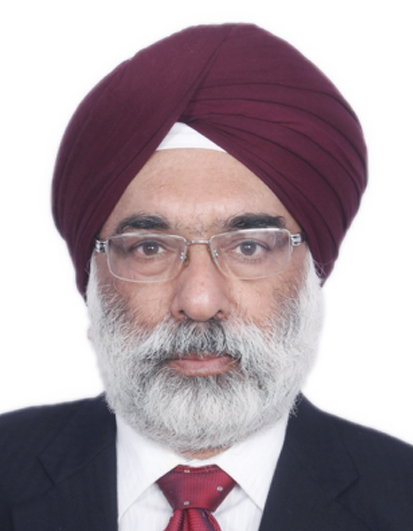
The Transatlantic Alliance Looks Up

With the arrival of 2022, Germany took over the presidency of the G7. It is a new experience for the ‘traffic light’ three party coalition of Germany which has an SDP chancellor and Green Foreign Minister.
Having made the initial visits to Paris, Brussels and European capitals, Foreign Minister Baerbock made a brief visit to Washington. She met her counterpart Secretary Blinken and the Speaker of the House of Representatives, Nancy Pelosi. She did not meet President Biden or Vice President Harris.
The coalition’s charter puts Europe first in their policies to strengthen the European Common Foreign and Security Policy. They are also committed to strengthening the Transatlantic Alliance with the United States. The early visit of Baerbock sought to implement that aspect. She had met Blinken earlier at the G7 meeting in Liverpool in December 2021.
Chancellor Scholz had met President Biden along with Angela Merkel at the G 20 in Rome and in December had a telephone call with Biden in which they reaffirmed support for robust US-German relations and Transatlantic cooperation.
The German coalition started with a positive perception in the German public mind that relations with the US were extremely important. A survey published by the Koerber Stiftung discovered that over the last year German popular appreciation of the US had risen from 10% to 45%. Also, 75% of respondents saw the US as a partner for protecting European security; 64% as a partner for promoting free trade and 63% for protecting democratic values and human rights. Interestingly, the importance of France as a partner for Germany decreased by about 20% in that period.
Some Germans do believe that the US is a partner for climate change and countering covid. About half believed that US was an effective partner in dealing with Afghanistan and China. 67% of German respondents believe that closer relations with the US are important compared to 19% for China and 16% for Russia.
Thus, between the coalition compact and the survey, it appears that rejuvenating the Transatlantic Alliance is a popular preference.
With the Trump administration out of the way and Germany taking a fresh look after the long 16-year Merkel period, perceptions will play a key role. Germany is seen as at the core of Europe, playing a leadership role. An important member of the G7, G20, NATO and the Organisation on Security and Cooperation in Europe (OSCE).
About 40 million people of German origin live in the US and are the largest ethnic ancestry group there. Economically speaking, Germany, as Europe’s largest economy, is at the core of the EU-US partnership. US has invested about $150 billion in Germany, while Germany invested $525 billion in the US, comprising 29% of all FDI from the EU. The coalition compact points to the need for Germany to enhance its technology profile and in this collaborating with the US is an important aspect.
Politically speaking, the US recognises that US and European security are interdependent. As NATO allies, Germany and the US have worked together for pursuing peace and security. Despite a small military, Germany played significant roles in NATO’s collective defence missions. It is part of the framework nations for NATO’s Enhanced Forward Presence, NATO’s Baltic air policing and on NATO’s Very High Readiness Joint Task Force in 2019. US-German military collaborate in NATO and UN operations like Mali and in the Balkans. Germany was part of the UN mandated International Security Assistance Force in Afghanistan, suffering 53 casualties.
Since 2015, when Germany opened up to migration it was an active contributor to the global coalition to defeat ISIS. Germany maintained troops as part of the NATO Training Mission in Iraq and remains a financial contributor for stabilization in Syria. NATO’s operation Sea Guardian in the Mediterranean and around Lebanon, included German naval vessels, much as a naval frigate is currently on a tour of the Indo-Pacific. The point to emphasize is that the German-US relationship is not merely economic. It has significant strategic content, which is often unnoticed.
With Baerbock’s visit three aspects emerge. First, Germany sincerely wants to collaborate with the US, but as a fulsome partner, and not a surrogate. It wants its views heard and the European options respected. Germany supports the US because they share democratic values. But Baerbock did not hesitate to mention the concerns that they had as she was in Washington on the eve of the anniversary of the Capitol riots. What Baerbock left unsaid is that Germany needs to determine whether Trumpism is defeated or will return. They are happy to do business with the Biden administration, but would be discomforted if a Trump-like administration was to return to Washington.
Secondly, the US prefers a stronger European reaction in dealing with Russia and China. On China, Baerbock as a Green has greater skepticism than the pragmatic SPD. She is better aligned with the US challenge to China. This did not appear to come up for much discussion in her talks in Washington. These were dominated by Russia where the US sees an imminent threat. Both agreed that if Russia was to invade Ukraine, that would be unacceptable and will lead to dire consequences. They seem to have worked out what these consequences would be and will be ready to impose them if Russian troops entered Ukraine.
There is a German desire to discuss matters with Russia. Europe and Germany prefer a more egalitarian approach while the US prefers a robust one. In response to a question at their press conference, Baerbock said that Europe and Germany do not want their institutional arrangements to be overlooked as the US deals with Russia. They agree with what needs to be done. In the manner of doing things, they will not overlook the Normandy Format under which Russia and Ukraine will join Germany and France to discuss the conflict in Ukraine. The Normandy Format was established in July 2014. It has met again in January; both France and Germany were represented by advisors to the leaders and not the foreign ministries. Both the US and Germany prefer the diplomatic path and de-escalation. The response depends on what Russia chooses to do.
Russia has been made aware that it would face consequences if it transgresses into Ukraine. The US has also been told that Germany would respect European discussion forums including through the EU and the OSCE. Blinken demurred on this, basically drawing a distinction between arms control talks with Russia, which required a clearly bilateral engagement with the US; he seemed willing to engage with Germany and Europe for the questions of Ukraine and Lithuania.
There is no doubt that the robustness with which the US wants to deal with Russia is different from Germany. There is also the question of the Nord Stream 2 gas pipeline. Blinken was at pains to say that no gas flows through the pipeline as yet. If Ukraine was invaded, the opportunity for the gas to flow would be closed. Baerbock was less forthcoming on this because though her Green Party has been opposed to the pipeline, the Chancellor and his SPD have been its supporters, and it in fact now exists.
The question that is tossed up is whether the pipeline changes the geopolitics and makes Germany and Europe dependent on Russian energy or alternatively, does European demand, make Russia a responsible partner?
The issue of Ukraine is muddied by Russia sending in troops to quell the civil uprising in Kazakhstan. It seems to be under invitation and under the Collective Security Treaty Organization (CSTO).
The rebalancing of the Transatlantic relationship between the US and Germany has an unstated aspect. Germany and the EU know that they must seek space separate from the US to prevent being blindsided by US policy as it happened with the Trump administration in Iran, and with the Biden administration in Afghanistan. They would like to choose their fights better. With regard to the enhancement of defence budgets, Germany remains committed at the macro level, but anxious because their economy is not presently capable of attaining a defence expenditure of 2% of GDP, which the US has demanded from all NATO members.
**********************
Disclaimer
The opinions expressed in this article are the author’s own and do not reflect the views of Chanakya Forum. All information provided in this article including timeliness, completeness, accuracy, suitability or validity of information referenced therein, is the sole responsibility of the author. www.chanakyaforum.com does not assume any responsibility for the same.
Chanakya Forum is now on . Click here to join our channel (@ChanakyaForum) and stay updated with the latest headlines and articles.
Important
We work round the clock to bring you the finest articles and updates from around the world. There is a team that works tirelessly to ensure that you have a seamless reading experience. But all this costs money. Please support us so that we keep doing what we do best. Happy Reading
Support Us





















POST COMMENTS (0)